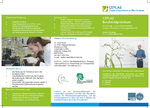Experimental approaches
Until now, the Practical Teaching Modules (PTM) have focused on the interactions between plants and their microbiota - one of the complex plant traits investigated in CEPLAS. A prerequisite for the selected research topic(s) to be developed as a PTM is to fit to the requirements of the university-entrance diploma (Abitur) as well as to the biology teaching curricula (Kernlehrplan) in advanced secondary-schools with emphasis on the subjects ecology and genetics. This facilitates the integration of the ResEdu program activity, besides its role as extra-curricular activity, in an elective college-level subject (Leistungskurs). Accordingly, several secondary-school pupils have used their experience at the “CEPLAS Research and Education Pupils Laboratory” to do their mandatory “school-practical” (Facharbeit).
The following activities and opportunities for experiments have arisen in this regard:
CEPLAS Research and Education Pupils Laboratory
Study class: 10th -12th grade
Duration: 5 days (full day)
Objectives: Describe symbioses between plants and microorganisms and their genetic interaction; explain the importance of symbioses for plant nutrition; link knowledge of ecology, morphology, physiology, and genetics of root zone symbioses. Additionally, we will extensively discuss scientific methods and pupils will perform experiments at the macroscopic, microscopic and molecular level.
Number of participants: 12 pupils
Dates: Spring (Easter holidays), Fall (Fall holidays).
Location: Institute of Botany, Biocenter, Zülpicherstraße 47b, 50674 Cologne, Germany.
Registration: by E-mail to ceplas-resedu@uni-koeln.de
Free of charge!
CEPLAS Research and Education Soil-project
Plant health is undeniably linked to soil health. A healthy soil can perform very important functions including: sustain water and nutrient cycles, sequester carbon and provide the basis for food production. School gardens offer a space for learning and take the theory into practice for outside experiments, nonetheless, not every school has access to such resources. Plant cultivation systems (so-called microcosms) allow investigations under controlled conditions in the school building regardless of the availability of a school-garden. The design of the planting can be carried out in accordance with the scope of a teaching module or be adequate to thematize different topics (for example, nitrogen cycle, water cycle, pH among others). Standardized analytical methods, measurements of physical parameters and protocols allow comparative studies of biodiversity and soil properties at different locations making the project dynamic and interesting for the pupils, the mini-projects can be also used as an entry point to discuss socio-economical and scientific relevant current topics such as climate change.
CEPLAS researchers can support the teaching modules experimentally and refine simplified methods for the analysis of soil properties and biodiversity.
Microcosms
Study class: 10th-12th grades
Duration: 3-4 days (1-2 hours each)
Objectives: to find out which microorganisms and the addition of which fertilizers could play a positive role in the development of plants, for this we use different plant species with different nutritional needs.
Number of participants: Group
Dates: Summer
Location: school
Registration: by E-mail to ceplas-resedu@uni-koeln.de
Mobile laboratory soil analysis (soil suitcase)
Target group: teachers
Duration: 4-hour workshop
Objectives:
- Determination of soil properties in the field using a mobile experimental kit (soil suitcase).
- Practical learning of the methods of soil analysis from the soil suitcase.
- Short introduction to the topic soils as well as a discussion about the possible applications of the suitcase in the classroom and the connection to other school projects of the CEPLAS ResEdu program.
Number of participants: 6 participants
Dates: Flexible
Location: Institute of Botany, Biocenter, Zülpicherstraße 47b, 50674 Cologne.
Registration: by E-mail to ceplas-resedu@uni-koeln.de
Free of charge!
Soil characterization, functions and its impact on biodiversity
In a first pilot experiment we characterized several soil probes, qualitatively compared their microbiology and concluded that the soil is a complex ecosystem that sustains life. From this first experience teaching materials are being developed to address diverse topics relevant for the ecology course.
(https://www.gymnasium-frechen.de/projekt-lebendige-boeden-des-gymnasium-frechen-bei-abschlussveranstaltung-von-jugend-gestaltet-den-strukturwandel-ausgezeichnet/)
CEPLAS Research and Education integration of mobile devices and technologies
To increase the scope of the ResEdu program and keep it with the pace of modern technologies we have established a long-term research and teaching cooperation with the group of Prof. Dr. Uwe Dettmar, Institute of Communications Engineering (Nachrichtentechnik) at the Technical University of Cologne (“Technische Hochschule Köln”, THK). Within the framework of this cooperation we work towards better monitoring different soil physico- and chemical characteristics and remote control watering protocols under the use of Internet of Things. Concise offers are currently under development.
